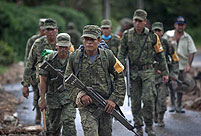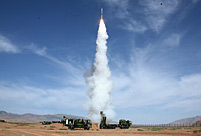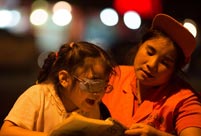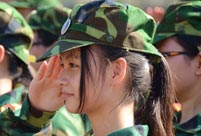WASHINGTON, Sept. 19 -- Despite Russia's agreement with the United States to secure Syria's chemical weapons, the deal may yet see tensions over enforcement.
Over the weekend, Washington and Moscow cut a deal to place Syrian chemical arms under international control in a bid to avert a U.S. military strike on the embattled Middle Eastern country. But in subsequent days the U.S. and Russia have been at odds over the agreement's enforcement.
The U.S. wants to hold the use of military force as a possible punitive measure if Syrian President Bashar al-Assad does not uphold his end of the bargain to declare chemical weapons and allow UN inspectors into his country.
But it remains unknown whether Washington can get a UN Security Council resolution that would allow a punitive military strike if the Syrian government fails to cooperate.
"I suspect the Russians are going to be very hard to move on that issue," Steven Pifer, former U.S. ambassador to the Ukraine who has held a posting in Moscow, told Xinhua.
"But we are just going to have to see how the negotiations and language go in New York on that," he said, referring to negotiations at the UN headquarters.
Indeed, Russian Foreign Minister Sergei Lavrov on Monday dismissed calls for a UN resolution authorizing military force against Syria if Assad does not comply with plans to secure chemical weapons, arguing that such calls amounted to a "lack of understanding" of the plan.
"Both sides understand that this was going to be a hard process," said Pifer, now a senior fellow at the Brookings Institution, but he added that Washington's cooperation with Moscow in cutting the deal was a positive development in the relationship.
"We still have to see what actually happens and how this plays out," he said.
The arrangement comes amid what experts describe as a cold patch between the U.S. and Russia - brought on in part by sharp differences over Syria - which chilled even further after Russia gave asylum to classified information leaker Edward Snowden, to the irritation of Washington.
Still, experts warned against billing the U.S.-Russia relations as being at a post-Cold War low, as the two sides have agreed on a broad range of issues including the Korean Peninsula, Iran and nuclear weapons reductions.
Experts said Russia is motivated in part by a desire to be seen as a leader on the world stage.
Pifer added that three weeks ago saw a somewhat marginalized Russia, as the U.S. seemed on the edge of striking Syria, which would have made Moscow appear impotent if it could not protect its longtime ally.
Now, Russian President Vladimir Putin's diplomatic efforts have put Russia at the center of an important issue, a plus for Moscow in terms of Russia's place in the world, Pifer said.
Meanwhile, Russia on Wednesday blasted a UN report on Syria's chemical weapons use, calling it biased, although the report did not assign blame to any group.
The criticism came amid UN efforts to hammer out a draft resolution that would ensure Assad's commitment to give up its chemical arms stockpiles.
 Storms leave 97 dead, 58 missing in Mexico
Storms leave 97 dead, 58 missing in Mexico New model of indigenous surface-to-air missiles testfired
New model of indigenous surface-to-air missiles testfired  118.28-carat diamond to be auctioned in HK
118.28-carat diamond to be auctioned in HK Maternal love under streetlight
Maternal love under streetlight Naked foreign student sits in the middle of a road in Haikou
Naked foreign student sits in the middle of a road in Haikou  Colorful Yunnan: Enjoy the natural beauty
Colorful Yunnan: Enjoy the natural beauty Harbin named Chinese city with most beautiful women
Harbin named Chinese city with most beautiful women New college students' military training in Guangzhou
New college students' military training in Guangzhou Rugby girls
Rugby girls PLA's 38th Group Army conduct training
PLA's 38th Group Army conduct training Residences of the royal house of Savoy
Residences of the royal house of Savoy The last days of Wan Aihua
The last days of Wan Aihua Highlights at 12th National Games of China
Highlights at 12th National Games of China Beijing Film Academy welcomes freshmen
Beijing Film Academy welcomes freshmen 2013 Taiwan Int'l Tourism Expo kicks off in Taipei
2013 Taiwan Int'l Tourism Expo kicks off in TaipeiDay|Week|Month